




Those who grew up listening to Janis Ian's folk songs might be surprised at her secondary career.
You probably know Janis Ian from her five-decade folk legacy — not from her short stories about spirit possession and intergalactic sex spies.
But Ian, the singer and songwriter behind the 1975 Grammy-winning hit “At Seventeen,” also writes sci-fi. She’s attended at least one Worldcon, published stories in compilations edited by Mike Resnick and Tamora Pierce and, in 2003, helped assemble an anthology of stories by Hugo and Nebula award-winning authors based on her own songs.
When she performs in the Bay Area this coming week, she’ll probably be singing, not reading, and her lyrical contributions to folk history’s more radical side are reason enough to attend. Over the last 50 years, she’s covered domestic violence, incest, teenage body alienation and even rape culture (in 1967, at that, when hashtags were still just number signs), taking many a nuanced look at the politics surrounding girls’ bodies, and the ways those politics are internalized.
In other words, her music matters. But so does her sci-fi. And a strange symmetry comes from pairing her songs with the stories she’s written and edited, which also take on power dynamics and sexuality but feature ghost boyfriends and digital purgatories full of stairs.
Take “His Hands,” from her 1993 album Breaking Silence. A mixture of soft vocals and dangerous, grinding-in-a-dive-bar-at-2am guitar swing, the song pulls you in then shoves you away, building tension through the narrator’s ambivalence.
“His hands, they never hit me sober,” she sings. “His hands, they never marked my face.”
It’s a complex, defiant look at abuse that both condemns the unnamed “he” while humanizing him, revealing that she loved him, that she left him and that he, too, had once been a victim. You probably wouldn’t expect it to inspire a story about a planet-hopping sociopath forced to undergo a sex change. But it did: Ian’s “Second Person Unmasked,” which appears in the anthology Stars: Original Stories Based on the Songs of Janis Ian.
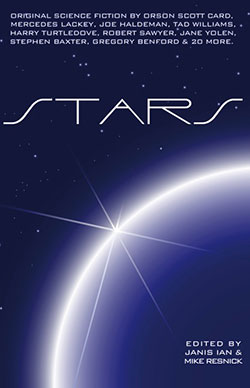 The “he” in that story (written, effectively, as “you”) carries a spring-loaded double switchblade, wears a belt with a sharpened buckle and has a high forehead, which in Ian’s words has “don’t-fuck-with-me written across it in lines that took decades to accumulate.” He’s an obvious predator — a literal lady killer — and from his homophobia to his conquistador walk, he’s easy to hate.
The “he” in that story (written, effectively, as “you”) carries a spring-loaded double switchblade, wears a belt with a sharpened buckle and has a high forehead, which in Ian’s words has “don’t-fuck-with-me written across it in lines that took decades to accumulate.” He’s an obvious predator — a literal lady killer — and from his homophobia to his conquistador walk, he’s easy to hate.
But then, when two blonde girls with silver necklaces seduce him, trap him, and ship him off in a cargo freighter; when he’s sold into slavery, re-educated, starved and then changed into a sociopath-trapping girl himself, you start to pity him. Not really — “he” was terrible, even if “she” isn’t — but the story plays with your initial repulsion. Like the song, it takes a hard look at both the cyclical nature of abuse and the structural links between gender hierarchy and violence.
Or take what is probably Ian’s most well known song, “At Seventeen.” Post-30 Rock, when a drunk Liz Lemon did karaoke to the song and someone from the crowd heckled “You’re bumming us out!,” it’s easy to dismiss the sad-sack anthem everyone knows so well: “I learned the truth at seventeen / That love was meant for beauty queens.” But though the song’s ubiquity makes it feel dated, it’s about more than being, in Ian’s words, one of the “ugly duckling girls.” It’s a deep look at the very concept of prettiness — the sexism and racism folded into who, exactly, defines it; the fact that it can control your life.
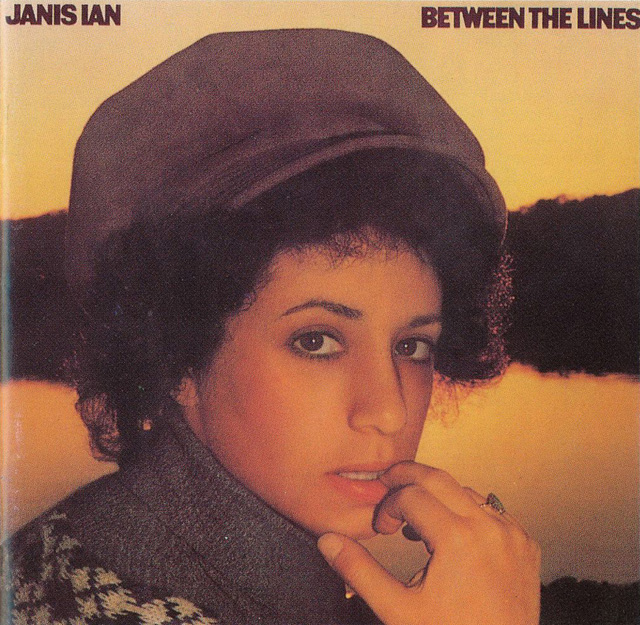 Janis Ian’s 1975 album Between the Lines, which featured “At Seventeen.”
Janis Ian’s 1975 album Between the Lines, which featured “At Seventeen.”And in Stars, it inspired a story about a supernatural suicide pact.
Written by Terry Bisson, the story is called “Come Dance With Me,” and opens with a boy and girl standing on a metal desk tying nooses around each other’s necks.
They’re trying to enter The Realm, an afterlife seen only by performing a specific ritual: Sit down at your computer, turn on repetitive music (preferably with the same four chords over and over), type in a secret URL, hit return, enter the user name you’re prepared to use for all eternity, and type the password: Kevork. When you see The Realm from this side it’s all stairs, no floor, no ceiling, and it looks so decadent that “even the shadows are gold.”
But that’s just to see it. To enter, you have to die.
The story follows Amaranth, the girl, and her futile attempts to get there. When she finally does, briefly, before being whisked out by paramedics, it’s grey, full of concrete instead of gold, and although she can still whisper, she’s lost her voice. It’s obviously a departure from the details of Ian’s hit (which mentioned neither suicide nor secret URL) but it feels the same. It feels like self-devaluation for a disembodied ideal; like the bulimia that myself and so many of my friends struggled with at Amaranth’s age; like the anxious buzzing that comes with willing yourself to take up less and less space. It feels like being a teenage girl.
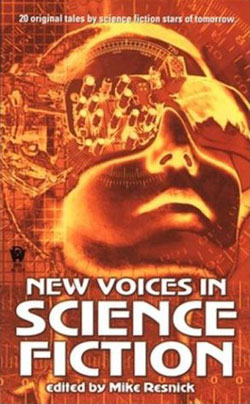 And those are only two stories — one written by Ian, one inspired by Ian. She’s also written about sister wives on a planet with two moons (Mahmoud’s Wives) and spirits who can possess bodies, but can’t control hearts (Eli and the Dybbuk). The anthology she helped compile contains a temporary apocalypse, a high-school reunion and a sad mermaid with scales like feathers, “so light-colored they all but disappeared into the green-gold skin.”
And those are only two stories — one written by Ian, one inspired by Ian. She’s also written about sister wives on a planet with two moons (Mahmoud’s Wives) and spirits who can possess bodies, but can’t control hearts (Eli and the Dybbuk). The anthology she helped compile contains a temporary apocalypse, a high-school reunion and a sad mermaid with scales like feathers, “so light-colored they all but disappeared into the green-gold skin.”
Bottom line: If you’re a Janis Ian fan, you should read her sci-fi. Here’s a comprehensive list with links. Her complex, controversial songs are an indispensable part of the folk cannon, and the weird stories they’ve inspired don’t just deepen and complement them — they do it with spaceships, micro-gravity and haunted phones.
The Justice Department and FBI have formally acknowledged that nearly every examiner in an elite FBI forensic unit gave flawed testimony in almost all trials in which they offered evidence against criminal defendants over more than a two-decade period before 2000.
Stewart’s decision to retire as host of the satirical news show after 16 years has left liberal America in mourning. So why is he leaving just before an election – and what will happen when he steps out from behind the desk?

There was no one moment when Jon Stewart knew it was time for him to leave what he describes as “the most perfect job in the world”; no epiphany, no flashpoint. “Life,” he says, in the lightly self-mocking tone he uses when talking about himself, “doesn’t really work that way, with a finger pointing at you out of the sky, saying, ‘Leave now!’ That only happens when you’re fired, and trust me, I know about that.” Instead, he describes his decision to quit The Daily Show, the American satirical news programme he has hosted for 16 years, as something closer to the end of a long-term relationship. “It’s not like I thought the show wasn’t working any more, or that I didn’t know how to do it. It was more, ‘Yup, it’s working. But I’m not getting the same satisfaction.’” He slaps his hands on his desk, conclusively. “These things are cyclical. You have moments of dissatisfaction, and then you come out of it and it’s OK. But the cycles become longer and maybe more entrenched, and that’s when you realise, ‘OK, I’m on the back side of it now.’”
Stewart and I speak twice in the space of a few months. The first time last October, when he flew from New York to London with his family for the premiere of his directorial debut at the London Film Festival. Rosewater is an engrossing and pacy film that tells the true story of Iranian-born journalist Maziar Bahari, who was arrested and tortured in Iran in 2009, after sending footage of street riots to the BBC.
The second time, we speak soon after Stewart announces his retirement from The Daily Show. He is in his office in New York, preparing to shoot a Friday-night episode, and the difference in his mood is striking. His voice is about an octave lower, and he sounds weary, weighed down.
But talking about his film in London, he is animated to the point of hyperactivity, gleefully pointing out the pretentious decor in the hotel room where we meet (“A photo of a submissive woman with a cigar in her mouth! Just what every room needs!”). He notes, in a tone that is both sincere and satirical, and that will be familiar to fans of The Daily Show, the lavishness of the food: “My compliments to the prop master, because that really is a beautiful tomato and mozzarella salad,” he intones solemnly to a bemused waiter.
It was heartbreaking interviewing Obama... that's what the gig is
Like every TV celebrity, in person, Stewart is both better-looking than you expect and smaller, with his long torso making up most of his 5ft 7in, giving the illusion of height from behind his studio desk. He is dressed casually, and after years of watching him on TV wearing a suit, seeing him in a T-shirt and casual trousers feels almost like catching my father half-undressed.
At 52, Stewart has the bouncy energy of a man half his age and, unlike most in the public eye, has an aversion to compliments. If I tell him I liked something about the film, he will immediately deflect the compliment and insist it was all down to Bahari, or the film’s star Gael García Bernal, or the crew. For all the claims of his detractors that Stewart is the epitome of East Coast elitism, there is more self-deprecating New Jersey grit here than arrogant Manhattan elan.
Much as he might wince to hear it, for the past 16 years Stewart has occupied a place in America’s cultural and political life far greater than the small audience of his cable show would suggest. The Daily Show’s simple format consists of a mix of reports from roving reporters (who have included Steve Carell, Stephen Colbertand John Oliver), monologues delivered by Stewart and an end-of-show interview. Over time, Stewart has evolved from a satirist to a broadcaster celebrated as the voice of US liberalism, the one who will give the definitive progressive take on a story.
Stewart on the Charlie Hebdo murdersHis moving monologue after the Charlie Hebdo killings in January was widely shared; his frequent on-air support of Democrat senator Elizabeth Warren helped her evolve in the eyes of the public from Harvard professor to dream 2016 presidential candidate – particularly among those who find Hillary Clinton too centrist and hawkish. Stewart’s energetic campaigning on behalf of the 9/11 first responders (the emergency services who were first on the scene, many of whom later suffered debilitating illnesses), prompted the New York Times to compare him to Walter Cronkite and Edward R Murrow, the most revered newscasters in American history. It is a delicious irony that in the world of American TV news, one populated by raging egotists and self-aggrandisers, the person who is generally cited as the most influential is Stewart – a man so disinterested in his own celebrity, he often didn’t bother to collect his 18 Emmys, preferring to stay at home with his family.
When George Bush left office in 2008, some worried that Stewart would run out of material. This proved as shortsighted as the hope that Obama would be America’s grand salvation. Stewart, who describes himself as “a leftist”, has always hammered the Democrats with the vigour of a disappointed supporter, and subjected Obama to one of his most damaging interviews during his first term: the president admitted that his 2008 slogan probably should have been “Yes We Can, But...” At the time, Stewart laughed, but today he admits with a shrug, “It was heartbreaking. It’s generally heartbreaking – that’s what the gig is.”
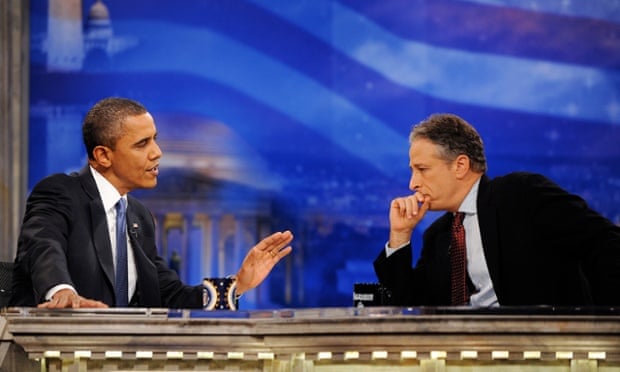 Stewart gave Barack Obama one of his toughest interviews, suggesting his 2008 election slogan should have been ‘Yes we can, but…’ Photograph: Empics Entertainment
Stewart gave Barack Obama one of his toughest interviews, suggesting his 2008 election slogan should have been ‘Yes we can, but…’ Photograph: Empics EntertainmentHis seemingly effortless interview with Tony Blair in 2008 cut through Blair’s crusader mentality in a mere six minutes, as Stewart calmly rejected Blair’s theory that any kind of military action can keep the west safe. As Blair stammered, huffed and shifted in his seat, Stewart concluded that: “19 people flew into the towers. It seems hard for me to imagine that we could go to war enough, to make the world safe enough, that 19 people wouldn’t want to do harm to us. So it seems like we have to rethink a strategy that is less military-based.” This was Stewart at his best; it’s also fair to say that some of the interviews, generally those with actors and authors, seem like mere puffery, a point with which Stewart agrees (he embraces criticism as eagerly as he deflects compliments).
How often does he really connect with his interviewees? “Have you seen the show? Mostly, I’m not even listening. But I can bullshit anyone for six minutes.”
When we meet in October, I ask if he is thinking of leaving The Daily Show because he seems increasingly, well, bored, making frequent references to the fact he’s been doing the show “for 75, 80, 1,000 years”.
Tony Blair gets the Jon Stewart treatment on The Daily Show in 2008.He bats away my question with a joke: “Are you offering me a job?”
Well, I might be able to get you Guardian work experience.
“Aww, I’m too shitty a writer for that.”
But he doesn’t reject the idea entirely (of leaving The Daily Show, that is. I think The Guardian will have to wait): “[If I left the show,] I would do what I’m doing. Whether it’s standup, the show, books or films, I consider all this just different vehicles to continue a conversation about what it means to be a democratic nation, and to have it written into the constitution that all men are created equal – but to live with that for 100 years with slaves. How do those contradictions play themselves out? And how do we honestly assess our failings and move forward with integrity?”
When I catch up with him again, I ask if he knew he’d be leaving when we had that conversation.
“No, no – but some of it had been in the back of my head for quite some time. But you don’t want to make any kind of decision when you’re in the crucible of the process, just like you don’t decide whether you’re going to continue to run marathons in mile 24,” he says.
He switches to a chewy exaggeration of his native Noo Joi-zy accent, deflating his seriousness with a comedy voice. “You wait until you’re done, you have a nice cup o’ water, you put the blanket on, you sit and then you decide.”
I had assumed that, as well as the metaphorical cup o’ water, he had decided to quit because he had so much fun making Rosewater. But Stewart says not.
“Honestly, it was a combination of the limitations of my brain and a format that is geared towards following an increasingly redundant process, which is our political process. I was just thinking, ‘Are there other ways to skin this cat?’ And, beyond that, it would be nice to be home when my little elves get home from school, occasionally.”
He has a 10-year-old son, Nathan, and a nine-year-old daughter, Maggie; Stewart and his wife, Tracey, have been married for almost as long as he’s been doing the show, after Stewart proposed to her via a crossword puzzle.
If anything, it was the prospect of the upcoming US election that pushed him to leave the show. “I’d covered an election four times, and it didn’t appear that there was going to be anything wildly different about this one,” he says.
Ah, but who could have anticipated the excitement over Hillary Clinton’s deleted emails?
“Anyone could, because that story is absolutely everything that it’s supposed to be about,” he says, with a groan; as a revelation, it managed to be at once depressing and completely unsurprising. “I also felt that, for the show, you don’t want to leave when the cupboard’s bare. So I think it’s a better introduction when you have something providing you with assisted fuel, like a presidential campaign. But really, the value of this show is so much deeper than my contribution,” he says.
If Oprah can leave and the world still spins, I honestly think it will survive me
Stewart likes to credit “the team”, but given that he has always been deeply involved in the script (unusually for a host), writing and rewriting drafts right up to the last minute, the show will be a pretty different beast without him. He has described his successor, the South African comedian Trevor Noah, as “incredibly thoughtful, considerate and funny”, and defended him when it was discovered, to widespread fury, that Noah had in the past tweeted offensive jokes about Jews, overweight women and transgender people.
The furore over Noah’s tweets reflects just how high Stewart has set the bar. There was such an outpouring of grief when he announced he was stepping down, that he mused on air the following day, “Did I die?” Even the normally dispassionate New Yorker magazine claimed, under the headline Jon Stewart, We Need You In 2016, “the last hope for bringing some rationality to the 2016 Presidential field died”. Not since Oprah Winfrey announced her retirement from network television has a US TV host’s departure received such international coverage, but Stewart bridles when I make the Winfrey comparison: “If Oprah can leave and the world still spins, I honestly think it will survive me.”
And it should be noted that not everyone was distraught. Fox News, displaying its mastery of making colour-based accusations about the kettle from its pot-based position, reported that Stewart was “not a force for good” and that his sustained criticisms of the right “had no foothold in the facts”. The Daily Show duly responded with a Vine of Fox News’ best factual distortions.
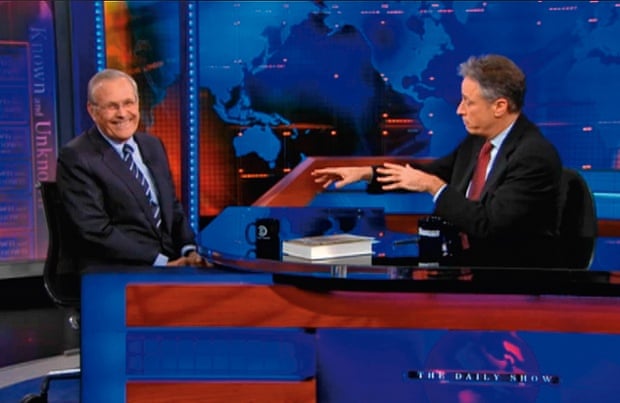 Stewart’s 2011 interview with Donald Rumsfeld is one of the few he now regrets: ‘I should have pushed, but he’s very adept at deflecting.’ Photograph: Comedy Central
Stewart’s 2011 interview with Donald Rumsfeld is one of the few he now regrets: ‘I should have pushed, but he’s very adept at deflecting.’ Photograph: Comedy CentralDoes he have any regrets? Stewart recounts one big disappointment – an anodyne interview with Donald Rumsfeld in 2011 that failed to claim the former secretary of defence’s scalp. “He just went into the general gobbledegook.” Stewart puts on a pretty good imitation of Rumsfeld: “‘Mnah mnah mnah, well, you have to remember, it was 9/11 mnah mnah.’ I should have pushed, but he’s very adept at deflecting.” He looks genuinely crushed for a moment, then rallies: “That interview with Rumsfeld went shitty, but it’s still just an interview. He’s the one who has to live with the repercussions of what he really did, so there’s nothing that could happen on my show that carries that same level of regret.”
In 2010, Stewart hosted a Rally To Restore Sanity in Washington DC, attracting 215,000 people, who cheered him on as he berated the media, or “the country’s 24-hour politico–pundit-perpetual-panic-‘conflictinator’.” I covered the rally for the Guardian and, as enjoyable as Stewart was, he didn’t look especially comfortable up on the stage, ginning up the people. He agrees that entering politics “is not my bag”: he’d rather make sense of the mess than get into it himself.
He can be brutal about the leftwing media, too (CNN has been a frequent target, for being mediocre and too attached to pointless computer graphics). MSNBC, the liberal 24-hour news network, is, Stewart says, “better” than Fox News, “because it’s not steeped in distortion and ignorance as a virtue. But they’re both relentless and built for 9/11. So, in the absence of such a catastrophic event, they take the nothing and amplify it and make it craziness.”
My biggest objection to Fox News, I say, is not the scaremongering, it’s the way it’s reshaped the Republican party. It will misrepresent social and economic issues, and promote the more extreme elements of the party, politicians such as Sarah Palin and Mike Huckabee, in a way that is hugely detrimental to American politics. (For the record, Rupert Murdoch disagrees, and last year claimed that Fox News “absolutely saved” the Republican party.) “Watching these channels all day is incredibly depressing,” says Stewart. “I live in a constant state of depression. I think of us as turd miners. I put on my helmet, I go and mine turds, hopefully I don’t get turd lung disease.”
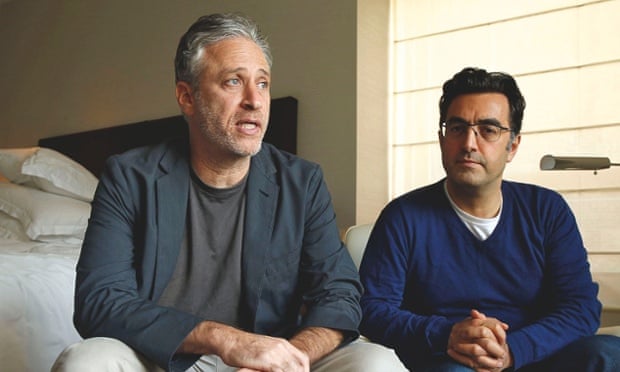 With Maziar Bahari, the Iranian-born journalist imprisoned by Tehran for filming the 2009 anti-government protests. Photograph: Rex Features
With Maziar Bahari, the Iranian-born journalist imprisoned by Tehran for filming the 2009 anti-government protests. Photograph: Rex FeaturesNow that he is leaving The Daily Show, is there any circumstance in which he would watch Fox News again? He takes a few seconds to ponder the question. “Umm… All right, let’s say that it’s a nuclear winter, and I have been wandering, and there appears to be a flickering light through what appears to be a radioactive cloud and I think that light might be a food source that could help my family. I might glance at it for a moment until I realise, that’s Fox News, and then I shut it off. That’s the circumstance.”
About a week before we met last year, Piers Morgan, who had just lost his nightly interview show on CNN, loudly blamed news anchor Anderson Cooper, whose show ran before Morgan’s, for his low ratings. Stewart shakes his head in wonder at this claim. “That guy may be the biggest – I mean, isn’t there a room underneath the Tower of London where you can just lock him up? He’s upset because he got shit-kicked. Who’s he going to blame – himself? That would mean self-reflection, of which he is incapable.”
We talk a little about what were then mere rumours that phone hacking had taken place at the Daily Mirror while Morgan was its editor. (It has since been alleged in the high court that hacking was carried out “on an industrial scale” during Morgan’s tenure.) “Right, that is a guy who is a bad person, which is fine – bad people are everywhere,” Stewart shrugs. “But where does something like that come from? Is there a secret fountain of doucheyness somewhere?”
Since he asked, I tell Stewart how Morgan and Simon Cowell became friends in the 1990s, after Morgan helped promote the Cowell-produced singing duo Robson & Jerome in the Sun. When Morgan was fired from the Mirror, Cowell returned the favour by casting him as a judge on his talent shows and, in turn, introducing him to an American TV audience.
Stewart’s face is frozen into a parody of Munch’s The Scream, and he is briefly speechless. “Well,” he eventually says, “all I can say is, ‘Damn you Robson and whatever the other guy’s name was.’ Just awful.”
***
Jon Stuart Leibowitz was born in New York and raised in New Jersey, the son of a teacher and a professor of physics. He grew up in the shadow of the Vietnam war and Watergate, events that left him, he has said in the past, “with a healthy scepticism towards official reports”. He jokingly recalls the time his older brother fired him from his first job at Woolworths as one of the defining, “scarring events” of his youth. But his parents’ divorce when he was 11 was clearly more so, prompting him to drop his surname and eventually legally change it to Stewart. He has described his relationship with his father as still “complicated”. “There was a thought of using my mother’s maiden name, but I thought that would be just too big a fuck you to my dad,” he says. “Did I have some problems with my father? Yes. Yet people always view it [changing his surname] through the prism of ethnic identity.”
 Stewart with his children, Nathan and Maggie, in 2011. Photograph: Getty Images
Stewart with his children, Nathan and Maggie, in 2011. Photograph: Getty ImagesSo it was a family thing as opposed to a Jewish thing? “Right. So whenever I criticise Israel’s actions it’s [he puts on a Yiddishy accent] ‘He’s changed his name! He’s not a Jew! He hates himself!’ And I’m like, ‘I hate myself for a lot of reasons, but not because I’m Jewish.’”
After college, Stewart performed on the standup circuit in New York, landing his own talkshow on MTV in the 1990s. In 1999, he took over the then little-loved Daily Show on Comedy Central, turning it from hit-and-miss satire to the news- and politics-focused programme it is today. Coming to it at 38, he says, the job was so ideal, “I couldn’t have created one better”.
Since Stewart announced his departure, much has been written about him being the most trusted news source for young Americans. Stewart kiboshes this as “conventional wisdom. In the sea of information that surrounds people of that generation, I’d be truly surprised if their only news comes four days of the week, for a few minutes a night.” He laughs when I describe him as a celebrity (“I’m not Madonna!” he hoots, raising an eyebrow). The only restriction fame has put on his freedom, he says, is “I don’t hang out on the Upper West Side during Sukkot”. Isn’t he being a bit faux modest, I ask, especially when he insists that what he does is comedy and not news? That comes with a certain profile. He thinks about this for a few seconds. “It’s not that I… I mean, it’s satire, so it’s an expression of real feelings. So I don’t mean that in the sense of, ‘I don’t mean this.’ What I mean is, the tools of satire should not be confused with the tools of news. We use hyperbole, but the underlying sentiment has to feel ethically, intentionally correct, otherwise we wouldn’t do it.”
‘Would I watch Fox News? If it was a nuclear winter and it might help my family’
If Stewart ever needed proof that his show has an impact, he got it in pretty much the worst way possible in October 2009, when he discovered that Iranian guards had arrested Maziar Bahari shortly after he gave an interview to The Daily Show in Iran. “And not just Maziar, but everybody we interviewed there had been arrested. So, being American, we thought, ‘This must be all about us!’” he says.
The Daily Show spoke to the prisoners’ families and asked what they could do to help, and the response was unanimous: keep talking about the arrests on the show. So Stewart did. Ironically, the reason The Daily Show had gone to Iran in the first place was to undermine Bush’s description of the region as “the axis of evil”: Stewart wanted America to see a country populated by “people with families who are wonderful”. And although they found those, the project turned out to be, he says, “a very, uh, sobering experience”.
When Bahari was released after 118 days, Stewart learned that his Iranian guards had cited the (completely benign) Daily Show interview he gave as a justification to torture and imprison him. “And that,” he says, with some understatement, “just stunned me.”
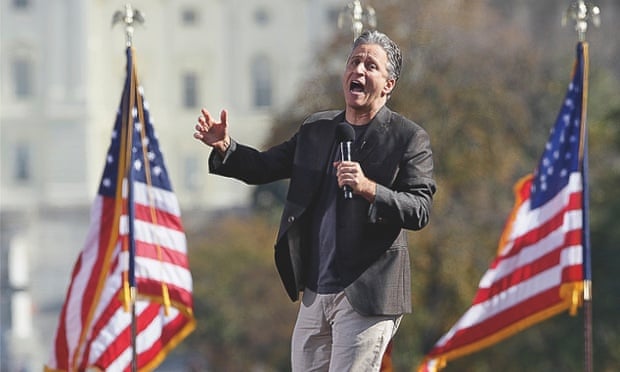 At the Rally to Restore Sanity and/or Fear, in 2010. Photograph: Carolyn Kaster/AP
At the Rally to Restore Sanity and/or Fear, in 2010. Photograph: Carolyn Kaster/APHe and Bahari became friends; when Bahari was in the US, they would meet for breakfast in Manhattan, near Stewart’s Tribeca home. Bahari said he hoped someone would make a movie of his book about his experience, Then They Came For Me. Stewart helped Bahari contact screenwriters, only to find that most were already busy, and he started to get, he says, “impatient with the process”. So, over oatmeal in a coffee shop, he and Bahari decided Stewart would write and direct the film himself.
Rosewater focuses primarily on the relationship between Bahari (Gael García Bernal) and one particular jailer, played by Kim Bodnia (Martin in Scandinavian TV thriller The Bridge). The movie wears its liberal heart on its sleeve, but reins in the tub-thumping for the sake of the story. Experts in Iranian relations will no doubt find the depiction of the government a little simplistic, and Stewart, characteristically, agrees.
“Look, it’s a film about Iran made by a New York Jew – it’s going to be reductive for those who are from the region. But hopefully, for an audience that is more western and more accustomed to films like Not Without My Daughter, this will appear to be a relatively nuanced portrayal. I got a whole pantheon of Sally Field references in here,” he grins, tapping his head, a reference to the hysterically anti-Iranian 1991 film.
A more obvious criticism is the lack of Iranian actors: Kim Bodnia, as Rosewater, is Danish and Bernal is Mexican. Stewart, again, concedes the point. “If I was Iranian, I’d probably look at [Bernal] and be like, ‘Really? Those Rs? Come on, man.’ But Maziar was our touchstone, and if he wasn’t bothered by it, I wasn’t bothered by it. My original vision was, ‘Maziar, we’re going to do this in Persian and use real prisoners and it’s going to be only Iranians!’ And he was like, ‘Don’t you want people to see it?’”
He did, but ultimately not that many people did, at least in the US. The film got decent reviews, but made only $3m – it turns out not that many Americans want to see a film about an Iranian prisoner. For once, perhaps, Stewart was just that little bit too progressive, something he has joked about on The Daily Show, mock weeping.
How disappointed was he? “Oh, sure, I would have liked more people to have seen it. But it’s a ridiculous thing to say. We got to prepare this incredible meal and then at the very end say, ‘Aww, I wish more people came.’ I don’t actually feel that way. I always knew the movie wasn’t The Hunger Games. But I hope it finds a little foothold in the UK.”
For the next few months, Stewart will focus on The Daily Show, handing over to Trevor Noah later this year and trying to convince viewers that it will be just fine without him. He has, he says, “a couple of other projects on the burner” – he would like to make more films – and it’s impossible to imagine him in fallow retirement. But it won’t be quite the same for us fans, getting to watch him every night, having him translate the day’s news for us. Stewart would scoff, but, for liberals who care about American politics, his departure from The Daily Show marks the end of an era.
“Honestly,” he says, “the country will survive.” And he’s right, it will. But even as he says it, it sounds, somewhat heartbreakingly, as if he’s already out that door.
• Rosewater is released on 8 May. The Daily Show is on Comedy Central (times vary).